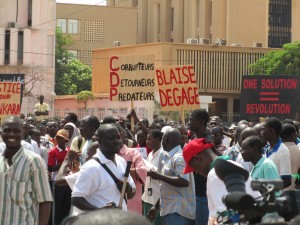Reporting the mutinies and civil unrest in Burkina Faso
 Journalists in Burkina Faso have faced difficult, dangerous and unpredictable conditions this year covering military mutinies, looting as well as civil unrest. The country has been gripped by a series of crises for several months. At least seven people including a young girl were killed when pro-government forces of President Blaise Compaoré quashed a mutiny in Bobo Dioulasso over May and June. This followed an earlier mutiny of soldiers in April. As a result of this violence, President Compaoré sacked top leaders of the military as well as his prime minister. The mutinies were preceded by violent student demonstrations in February. The protestors demanded justice after the killing of a university student in Koudougou, in the central-west of the country. Five police officers were charged with beating the student to death.
Journalists in Burkina Faso have faced difficult, dangerous and unpredictable conditions this year covering military mutinies, looting as well as civil unrest. The country has been gripped by a series of crises for several months. At least seven people including a young girl were killed when pro-government forces of President Blaise Compaoré quashed a mutiny in Bobo Dioulasso over May and June. This followed an earlier mutiny of soldiers in April. As a result of this violence, President Compaoré sacked top leaders of the military as well as his prime minister. The mutinies were preceded by violent student demonstrations in February. The protestors demanded justice after the killing of a university student in Koudougou, in the central-west of the country. Five police officers were charged with beating the student to death.
So how are journalists in Burkina Faso covering these conflicts? During the recent Global Media Forum, DW-Akademie spoke to Rémis Dandjinou, Vice-Director of Canal 3, the first private commercial television in Burkina Faso, founded 2002.
What role are journalists in Burkina Faso playing during this time of deep social unrest in the country?
Rémis Dandjinou: In a country with a fledging democracy like ours, journalists have always played an important role in promoting human rights. The recent mutinies have shown that the media have treated the situation in a very balanced way. The journalists give the voice to the people to talk about the violence they’ve suffered. So people can talk freely about the mutinies. There’s an open discussion about this going on in Burkina Faso.
How can journalists cover those military mutinies in military camps or in streets that have been deserted by the civil population?
We as journalists are lucky because we’re appreciated by the population. People feel like they need the media when they’re confronting the police or the military because the journalists can draw attention to their problems. When the mutiny in the military camp in Bobo Dioulasso happened people even felt like they could help us journalists. They called and said: “We know that you can’t come here to cover what is happening. We live just next door so we’re filming and taking pictures for you. Do with it what you want – we just want people to know what’s going on.” People have a lot of confidence in the way commercial media work when it comes to covering those incidents.
What you’re saying sounds like the freedom of press is not threatened in Burkina Faso. But we also remember the case of the famous journalist Norbert Zongo, who’s was killed 1998. His murderers still haven’t been punished… How safe do journalists in Burkina Faso feel today when they work in the field?
Total security doesn’t exist – no where and never. The same is true for self-censorship. It’s all a question of perspective. Talking about Norbert Zongo… I was lucky to host him for his very last interview at Radio Pulsar. I think his death has become an important incident for us. After that we’ve reached a level of freedom of speech that nobody can take away from us. I’m convinced that the freedom of speech and the freedom of press is part of the journalists’ daily life in Burkina Faso. I think that today no journalist in Burkina Faso has to fear physical threat. Norbert Zongo has paid with his life for the right to freedom of expression that we have today. The problem lies elsewhere. We can denounce cases of corruption or other but if there are no mechanisms of good governance at the level of public administration or at the level of justice our reports will not have any effect on people’s every day life.
Interview: Bob Barry
Translation: Christine Harjes




Feedback